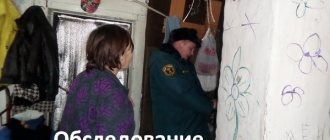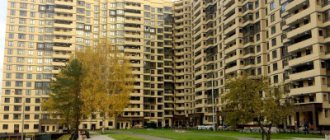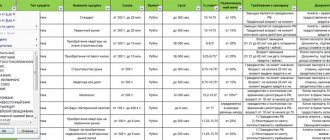The concept of deterioration of living conditions
The federal law does not clearly state what can be classified as deterioration of living conditions. However, housing legislation interprets this as actions as a result of which individuals become applicants for real estate on social terms. According to this, unintentional deterioration of living conditions includes:
- moving in and simultaneous registration of new residents in a house or apartment, with the exception of temporary ones. An example of this would be marriage registration;
- changes in family composition in the event of the birth of new members or divorce;
- exchange of real estate residential property and, as a result, reduction of its footage;
- the necessary transfer of part of the residential premises to non-residential premises, which entails a change in the procedure for using housing;
- alienation of shares or entire residential premises owned by citizens as a result of claims of creditors or other circumstances;
- eviction in court of the owner of the property and members of his family due to failure to comply with the terms of the purchase and sale agreement, gratuitous use, commercial lease, etc.;
It is important to note that the deterioration of housing conditions does not include any legal transactions of a lease agreement on the initiative of a person wishing to receive social real estate, registration of minor children at the place of residence of their parents, moving in of relatives or spouses subject to compliance with the law, as well as the recipient’s refusal to accept residential property as a gift or the donor from compliance with the terms of the gift agreement.
In addition, each region has its own law that determines what actions can be classified as worsening living conditions, so if you want to increase the area of your apartment on social terms, it is important to familiarize yourself with local legislation.
To get on the waiting list for social housing due to deteriorating living conditions, you must write an application in the prescribed form and sign it by all family members. Collect the necessary package of documents, including those confirming the right to receive additional space from the state, and submit it all to the Housing Policy Department at your place of residence. You can clarify the application form and list of documents on the website of this department or at any multifunctional center (MFC).
What is considered worsening conditions?
The following list explains what can be considered an intentional, deliberate deterioration of living conditions:
- registration (permanent) of one or more people in the property;
- legal separation of personal accounts and shares with re-registration of ownership rights in the Rosreestr database;
- relocation by decision of the courts to premises with worse consumer characteristics;
- sale, donation, other type of transfer of property rights with amendments to the Unified State Register of Real Estate;
- official refusal to conclude a social rental agreement with the municipality;
- changing the current status of individual parts of residential real estate.
The last point can be considered in detail. If you expand the corridor, kitchen, pantry or bathroom at the expense of rooms, you can reduce the living space (total and per person). After approval of the project and redevelopment, conditions will appear for registration in the queue for those in need. Such actions, in the absence of compelling evidence of special need, are considered an intentional deterioration of living conditions.
Military personnel
The deliberate deterioration of the living conditions of military personnel is determined by Order No. 1280 of the Ministry of Defense dated September 30, 2010. In accordance with it, the arrival of close relatives (with permanent registration at the appropriate address) may be considered intentional if these persons:
- were owners of real estate;
- did not comply with the procedures for terminating possession (use) of residential premises.
The list of intentional actions also includes the following items:
- entering into a fictitious marriage for the purpose of subsequent registration of the spouse;
- similar actions during a divorce, implying the allocation of shares of real estate to adult family members and children;
- registration of military donations, sales, exchanges, and other transactions for the alienation of real estate (full or part of the area);
- violation of operating rules.
Separately, situations are given that are not considered an intentional deterioration of living conditions:
- registration of children or other close relatives is made in full compliance with the requirements of current federal laws or by appropriate court decision;
- the property of a military man or spouse (owned/used) is an emergency facility;
- The building is subject to planned demolition.
Young family
State programs to support young families operate at the federal and regional levels. What refers to the deliberate deterioration of living conditions is determined taking into account the characteristics of a particular program. In general, the following can be considered intentional actions:
- conclusion (divorce) of marriage with a decrease in the share of property and the emergence of rights to receive subsidies;
- donation, other forms of alienation of property with registration in Rosreestr;
- permanent registration of third parties at the residential address without sufficient legal grounds.
Minors
During a divorce, property is distributed equally, unless otherwise specified in the text of the marriage contract. However, in any case, minor children retain rights of use (property), including the possibility of registration with either parent. It should be emphasized that such situations are not subject to the standard requirements for compliance with living space standards per person.
For your information! Violations are monitored and suppressed by guardianship and trusteeship authorities. In some situations, they may block changes in property rights in the Unified State Register of Real Estate with a prohibitory entry.
What is considered an intentional deterioration of living conditions, and what situation is not, can be considered using a specific example:
- a family (3 people) lives in an apartment with an area of 56 square meters;
- unless a different value is established in the region, with a standard standard of 18 square meters. m per person this is not enough for registration (18 * 3 = 54 sq. m.);
- after the registration of the wife's daughter from a previous marriage, conditions were created for receiving benefits: (18 * 4 = 72 sq. m);
- such actions may be considered an intentional deterioration of living conditions.
To prove otherwise, it is necessary to provide convincing arguments. These include the absence of:
- the other parent;
- guardians;
- another place for the child to live under normal conditions.
Young families
There is a special government program that allows young families (up to 35 years of age) to get an apartment on preferential terms (lower loan rate, repayment of part of the debt by the state, and so on). An important feature is that a young family must really need housing. For this reason, some parents deliberately go to various lengths to show that their children really need an apartment. This could be, for example, a canceled registration of a husband or wife, registration in the apartment of the parents of other relatives, and so on.
If, upon review of the application, it turns out that the deterioration of conditions was deliberate, then participation in the program will be denied.
Is privatization a deterioration in housing conditions?
Let us remind you that actions to worsen living conditions are actions that can lead to registration as applicants for housing.
As a result of privatization, you receive additional living space and, most often, can no longer be registered as specified persons. Therefore, privatization is not an action that worsens living conditions.
However, by receiving additional meters, you lose the right to be registered.
Is the refusal to privatize a deliberate deterioration?
The refusal of a person using real estate under a social tenancy agreement to privatize the property is not an intentional action to worsen living conditions. For registration, municipal authorities are guided by standard rules and area standards.
For your information! During planned demolition (renovation, other resettlement programs), the owner of a room in a communal apartment has the right to count on monetary compensation at rates established by local legislative bodies. A user under a social tenancy agreement can become the owner of a new apartment.
Is my husband's registration a deterioration in living conditions?
In each region, actions are established that do and do not lead to a deterioration in living conditions. According to Moscow legislation, registering a spouse does not relate to actions that worsen living conditions.
I can assume that the regions have approximately similar legislation and in your region these actions will also not be considered a deterioration in living conditions.
Important!
However, you need to make sure of this and look at regional housing legislation.
Is it intentional deterioration of living conditions:
Some intentional actions are highlighted that led to the deterioration of living conditions, which may become a reason for registration. Let's take a closer look at them.
Divorce
After a divorce, the person who owned the home before the marriage usually remains in the apartment where the family lived. The exception is situations in which the apartment has to be divided or sold with a subsequent division of the proceeds. In this situation, everything is very individual.
So, for example, if the family has really broken up and the spouse does not have a place to live, he/she receives the right to register. On the other hand, if the divorce with division of property was deliberate and special, carried out only in order to obtain new housing, then such actions will be considered intentional.
Consequences of intentional actions of spouses
Based on Art. 53 of the Housing Code of the Russian Federation, administration specialists may refuse to provide an applicant with municipal property under a social tenancy agreement. You will also be denied the opportunity to register for 5 years. But this is only administrative responsibility.
It is possible to be charged under Article 159 of the Criminal Code of the Russian Federation (fraud). In the case of a fictitious divorce, paragraph 2 of this article is charged (committing illegal actions by prior conspiracy). The sanctions are as follows:
- fine up to 300,000 rubles;
- correctional labor up to 480 hours;
- restriction of freedom up to 1 year;
- imprisonment for up to 5 years.
Often, judges agree with the prosecutor's request to recognize the spouses' actions as fraudulent. There are also legal consequences if a marriage is recognized as fictitious: all real estate transactions that were carried out after the divorce can be considered void, since the spouses continued to live together and did not end their relationship.
Before getting a divorce, you need to understand what the consequences may be in the future. It is strongly recommended not to resort to fraudulent activities, as they rarely go unpunished.
Refusal of inheritance
Refusal of an inheritance is almost never considered as a deterioration in living conditions. Firstly, the heir makes this decision independently. And secondly, if he does not live in the apartment that can be inherited, then there is no talk of any deterioration in living conditions at all.
If a person lives in an apartment that can be inherited, but deliberately refuses the inheritance, he does not receive the right to register, because he had housing and such refusal is intentional.
Refusal from privatization
Voluntary participation in privatization is a mandatory condition. If a person specifically refuses part of the property, he, in fact, loses nothing: he retains the right to free privatization of the apartment in the future and, in addition, receives the right to live in the same apartment for life, regardless of who becomes its owner . As a result, no deterioration of conditions occurs, which means the right to register does not arise.
Refusal to be included in the list of orphans
According to the law, every orphan has the right to free housing from the state. To do this you need to stand in a special queue. This is optional, but participation is not mandatory. Therefore, refusal to participate is not considered grounds for registration.
Methods for determining intent upon divorce
It is quite difficult to determine intent when dissolving a marriage among military personnel.
After all, it is important not only to determine intent in actions, but also to collect documentary evidence of such intent.
In this case, it is necessary to find out, for example, the following features of divorce by a military personnel:
- who initiated the divorce,
- How did the divorce happen?
- whether the serviceman has minor children or other dependents,
- How long after the divorce did the serviceman apply for recognition as needing improved living conditions?
Evidence of Intent
The deterioration of housing conditions can be expressed in various forms and actions, but the main and main evidence is that a direct causal connection must be established between the actions of a citizen and the purpose of such actions (registration as a person in need of housing).
Indirect circumstances and guesses without documentary evidence cannot be regarded as intentionality and should not be an obstacle to registering citizens as those in need of residential premises.
Practice shows that in most cases, citizens who worsened their living conditions did not do so intentionally for the purpose of registering.
Thus, a citizen can, before contacting local government bodies, commit actions that are a deliberate deterioration of housing conditions and are approved as such by a regulatory legal act of a constituent entity of the Russian Federation, but such actions were not committed by him for registration or provision of housing, but within the framework of freedom of contract . Therefore, Art. 53 of the RF Housing Code will not be applied.
What it is
In order to solve housing problems, it is necessary to register with the municipality. However, local authorities have to solve the problem of relocating emergency housing that has fallen into disrepair due to natural causes. This explains not only the large number of waiting lists, but also the conditions for inclusion in the list.
The basic requirement is a lack of square meters in the existing property. Each region sets its own standards. In addition to the actual law, the law establishes the concept of deliberate deterioration of living conditions. It is mentioned without detailed explanation in the RF Housing Code (Article 53).
Given the lack of clear definitions in federal legislation, the constituent entities of the Russian Federation approve their own rules. As of 2022, 15 regions have standards for registering citizens corresponding to this category.
The main sign of a deliberate deterioration of housing conditions is the presence of a targeted intent to obtain real estate (state financial assistance). The corresponding intention confirms that there is no need for additional space before certain actions are carried out. They also take into account the fact that living conditions have actually deteriorated, which became the basis for receiving state support.
Ways to worsen living conditions
The main ways of worsening living conditions that can be considered intentional when registering for housing:
- Change of real estate status. In particular, the transformation of housing into non-residential premises. This is clearly a conscious action. If the owner has nowhere else to live, it may be considered deliberate deterioration of conditions.
- Reducing the living space of the property. This could be, for example, turning a living room or bedroom into a large storage room or dressing room. There may be many such options, but they are extremely rarely considered as a deterioration of living conditions and, what is more important in this context, such actions are not, in fact, a deterioration. The fact is that now, when determining the area of housing per each of the registered persons, it is not the residential area, but the total area of the apartment that is used. Thus, the administration will not care how the premises are used and what their status is as long as the property remains residential.
- Refusal to conclude a social tenancy agreement. Some people, even after registering, want to get not just some housing, but a very good apartment. As a result, they may refuse to enter into a social rental agreement if the proposed apartment does not suit them. Such actions are considered deliberate and do not give the right to demand something better.
- Violation of the terms of a social tenancy agreement or violation of living conditions in an apartment. Most often, such situations involve non-payment of utilities over a long period of time (from several months to several years). As a result, the owner/tenant of the apartment will be evicted from the property he occupies upon unilateral termination of the social tenancy agreement or upon seizure of the apartment. Both courses of action are also intentional. The exception is situations when a person really has nothing to pay for utilities and he can prove it.
- Registration of new residents. This is the most common and controversial scheme. On the one hand, actions when the owner of an apartment registers his parents, relatives, wife, child, and so on cannot be called intentional. Especially if they have nowhere else to live. On the other hand, most often this is the scheme used to deliberately worsen living conditions: all available relatives gather and register in one apartment. Since the amount of space occupied will be less than any norm, it becomes possible to register. Such situations are usually considered on an individual basis. In addition, some regions have strict rules governing which persons' entry and under what conditions is an intentional or unintentional act.
- Housing or its sale to obtain an apartment of a smaller area. The simplest example: the sale of a two-room apartment followed by the purchase of a one-room apartment. Formally, living conditions have worsened, but in fact the person made such a deal himself, which means he did everything deliberately. An exception is made only for certain situations when the sale was a forced step.
One important point should be taken into account: these actions will become intentional only if, after implementing one of the things described above, a person immediately tries to register.
No violations
The articles of the Housing Code of the Russian Federation establish that citizens are given the right to move into the category of low-income people in order to get on the waiting list for housing.
In turn, the state undertakes to comply only with the legitimate demands of the applicants. So, for example, sometimes a contradiction arises when an individual had no claims regarding the expansion of living space, as a result of which the standards for square meters became lower than they were. The contradiction lies in the fact that there is no unlawful context here, since during the period of the applicant’s actions, he had not yet been registered. Referring, again, to the Housing Code, if at the time of filing the application there was no underestimation of square meters, then it is considered that there was no unlawful intent. Legislative nuances in some situations exclude proof of a citizen’s guilt, even if it is obvious. For example, a resident's inaction cannot be classified as deterioration. Thus, the latter has the opportunity to manipulate conditions and achieve what he wants without fear of responsibility, which in fact cannot be held to account. To date, no protective mechanisms have been developed against such tricks.
What cannot be considered intentional impairment
Not all acts qualify as a deliberate change for the worse in living conditions. In particular, these include the following actions:
- registration of a child with one of his parents, which follows from Art. 20 of the Civil Code of the Russian Federation, which presupposes that a minor is required to have a residence permit at the residence address of his father or mother. The appearance of a newborn in a family cannot be a malicious deterioration;
- registration in the premises of a new family member due to marriage or other relatives, for example, the owner’s parents;
- temporary registration at your own address, both relatives and third parties;
- the refusal of the donee to refuse a gift, which is living space, or the refusal of the donor directly to fulfill the gift agreement concluded by him;
- recognition of the transaction as not complying with the law by a court decision;
- cancellation of the rental agreement and return of the property.
Since such actions are not a deliberate deterioration of living conditions, a citizen, if there are appropriate grounds, the list of which is given in Art. 51 of the Housing Code of the Russian Federation, can join the housing queue and receive the square meters due to him.
We remind you that even if you thoroughly study all the data that is in the public domain, this will not replace the experience of professional lawyers! To get a detailed free consultation and resolve your issue as reliably as possible, contact specialists through the online form .
Consequences of recognizing the actions of citizens as deterioration of housing
The law defines punishment for citizens who, through their voluntary actions, worsen their living conditions, in the form of refusal for a period of five years to register with local authorities as persons in need of additional living space. It is also possible to be held accountable (administrative, criminal) for fraud with government social support measures.
However, determining the fact of intentionality of actions in the case of registration with local authorities in order to improve one’s living conditions is a rather delicate and controversial - since there is no specific regulatory document that would clearly define the line between:
- the truly plight of man;
- his conscious actions regarding the deterioration of living conditions.
Therefore, such cases are often resolved and disputed by citizens in court.
Examples from judicial practice
Judicial practice on the issues of determining the actions of citizens in the form of intentional deterioration of living conditions is quite diverse.
The Constitutional Court in its explanations says that intentional actions must be characterized by two characteristics:
- By intent.
- The artificial nature of actions.
Moving incapacitated parents to their children cannot be a violation, regardless of the presence of real estate in their property.
For military personnel, there is a dubious rule regarding marrying only ladies without permanent registration and their own home. This position is questionable from the point of view of many factors. This is an infringement of the rights to free marriage, which should not be in any way connected with housing issues.
The Constitutional Court also says that each specific case of such a situation must be considered individually in court, taking into account all the intentions and hidden motives of the actions of these subjects.
If a woman sells her home immediately before marriage, her young family will not lose the right to improve their living conditions. All her actions before marriage cannot be recognized by the court as deliberate deterioration of living conditions.
Intentional deterioration of housing conditions is a deliberate action on the part of a citizen by which he tries to acquire the status of someone in need of housing illegally . These actions may become an obstacle to registration in the future, since if there is evidence of premeditation of the actions, he will not be able to get on the waiting list for new housing for another 5 years.






